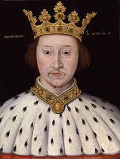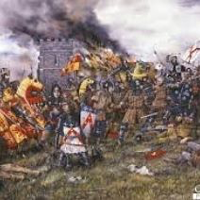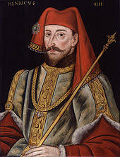The Hundred Years War
Part 4: Looking within


France, under new king Charles V (left), invaded Aquitaine again, completing the takeover in 1375. England at the time was consumed by the waning of King Edward III and didn't respond in an effective way. Edward died in 1377 and was replaced by his grandson, who became Richard II (right). (Edward the Black Prince had died the year before.) Charles V died in 1380, and the two countries looked for ways to talk peace. They found common ground and signed another truce, in 1389, the same year that England signed a similar peace agreement with Scotland, after yet another flare-up between those two countries that began in 1382. France's next king, Charles VI, had become king at age 11, when his father died. The new king went insane when he was just 23; the French response was to declare a regency, which descended into a power struggle. 

England was having its own internal problems in the last two decades of the 14th Century. The large-scale Peasants' Revolt had consumed the country in 1381, and another war with Scotland flared up in 1384. Richard II was deposed in 1399, giving way to King Henry IV. And, carrying on from that, as the 15th Century dawned, Owain Glyndŵr had himself declared Prince of Wales and gathered together a combined Franco-Spanish-Welsh force to challenge the supremacy of England. England put down this rebellion after a number of years. Next page > The English Ascendant > Page 1, 2, 3, 4, 5, 6, 7
|
|
Social Studies for Kids
copyright 2002–2026
David White



 The peace lasted for a few years, during which time both countries looked within. In 1369, the fighting was on again. England and France were on opposite sides of a dispute over the throne of Castile. The English returned to their chevauchée ways, devastating swathes of the French countryside; France responded by harrying some ports on England's south coast. In the 1372 Battle of La Rochelle, France regained control of the English Channel. The French followed that up with a low-level invasion of England, sacking the Isle of Wight and then a handful of towns in the southeast, including Hastings. The major French military leader during this time was Bertrand du Guesclin.
The peace lasted for a few years, during which time both countries looked within. In 1369, the fighting was on again. England and France were on opposite sides of a dispute over the throne of Castile. The English returned to their chevauchée ways, devastating swathes of the French countryside; France responded by harrying some ports on England's south coast. In the 1372 Battle of La Rochelle, France regained control of the English Channel. The French followed that up with a low-level invasion of England, sacking the Isle of Wight and then a handful of towns in the southeast, including Hastings. The major French military leader during this time was Bertrand du Guesclin.
